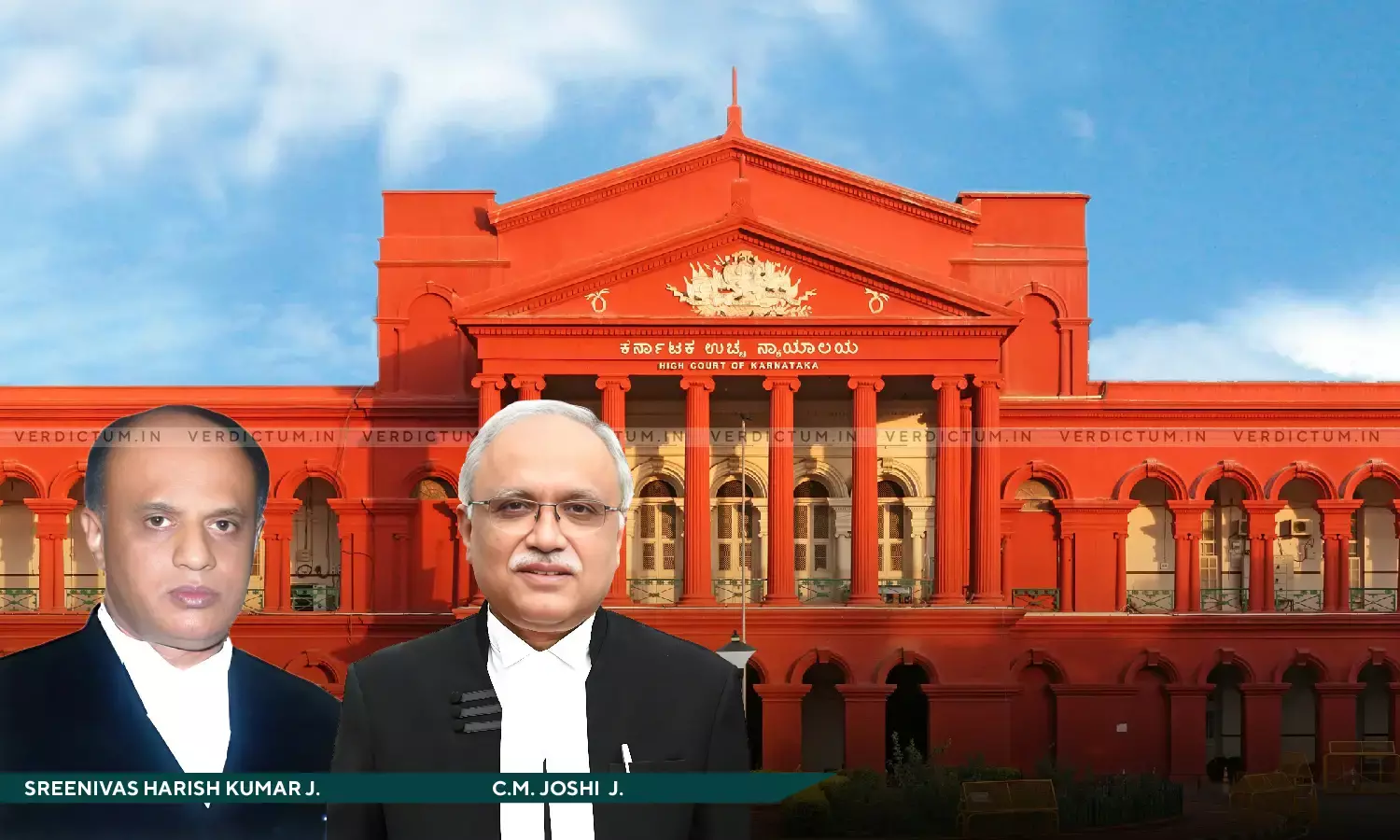Not Necessary To Record Conviction U/S 376 IPC If Clear Case Is Made Out For Conviction U/S 6 POCSO Act: Karnataka HC
The Karnataka High Court enunciated that it is not necessary to record conviction under Section 376(2)(i) and (n) of the Indian Penal Code (IPC) if a clear case has been made out for conviction under Section 6 of the Protection of Children from Sexual Offences Act, 2012 (POCSO Act).
The Court was deciding a criminal appeal filed against the judgment and order of conviction and sentence passed by the Additional Sessions Judge and Special Judge.
A Division Bench comprising Justice Sreenivas Harish Kumar and Justice C.M. Joshi observed, “Baby’s DNA profile matched with DNA profile of the accused. In the light of this evidence, accused was rightly convicted by the Special Court for the offences under section 6 read with section 5(j)(ii)(l) of POCSO Act. In view of a clear case being made out for conviction under section 6 of the POCSO Act, it is not necessary to record conviction under section 376(2)(i) and (n) of IPC. Therefore we do not find good ground to interfere with findings of the Special Court to convict the accused.”
Senior Advocate Hashmath Pasha represented the appellant while SPP-II Vijaykumar Majage represented the respondents.
Facts of the Case -
The appellant was convicted for the offences punishable under Sections 376(2)(i)(n) and 506 of IPC and Section 6 of POCSO Act and was sentenced to life under Section 6 POCSO Act, and simple imprisonment for one year with fine of Rs. 5,000/- for the offence under Section 506 IPC. The incident was of 2016 when the victim developed acquaintance with the appellant when she was a student of 5th standard as the latter used to visit the house of her neighbour. Once on her birthday, the appellant went to her house and took her to his house stating that there was a pooja in his house. However, there was nobody in his house when she went there and he took her inside a room of his house and subjected her to intercourse. As she screamed, he gagged a piece of cloth into her mouth and repeatedly subjected her to intercourse throughout night.
On the next day when the victim was about to leave the appellant’s house, she was threatened to be killed if she disclosed the incident to anybody. Thereafter, the appellant had intercourse with the victim 5-6 times and threatened of killing her family members if she would disclose the same to anyone. When she started fainting in the school, the teacher informed of it to her mother and the medical checkup revealed that she had become pregnant. At that time, she disclosed everything and in this regard, an FIR was registered. The victim gave birth to a female baby and the DNA test conducted during investigation confirmed that the appellant was the father of the baby born to the victim. Since the age was a deciding factor to invoke any of the offences under the POCSO Act, the question relating to the evidentiary value of the extract of School Admission Register was to be answered by the High Court.
The High Court in view of the above facts noted, “Ex.P8 is undoubtedly an extract of school admission register. PW5 being the headmaster of the school and custodian of the register vouched to the contents of Ex.P8. Except a suggestion that 16.06.2004 was not the date of birth of the girl, PW5 is not discredited in any way. He is a competent witness. He may not be having personal knowledge of the date of birth of PW1, but his evidence cannot be discarded because of this reason.”
The Court said that the entries made in the school admission register cannot be disbelieved and if for any reason the appellant knew that June 16, 2004 was not the correct date of birth of the victim, he could have disproved the extract by providing any evidence available with him.
“The investigating officer should have been questioned in the cross examination. Moreover no objection was taken when Ex.P8 was marked before the Special Court. … we find that the sentence imposed is disproportionate in as much the Special Court has failed to assign reasons for imposing maximum sentence of life imprisonment. Accused has to be sentenced in accordance with law as it stood on the date of crime i.e., before amendment was given into effect from 16.08.2019. Section 6 of POCSO Act as it stood then permitted imposition of minimum sentence of 10 years rigorous imprisonment to maximum of life imprisonment”, it added.
Furthermore, the Court said that to subject an accused to maximum sentence requires assignment of valid reasons which are not forthcoming in the impugned judgment and the strict scrutiny of the victim’s oral testimony discloses a shadow of consent on her part; but her consent is immaterial.
“Moreover her actual age, going by Ex.P8, as on 16.06.2016 was 12 years, but traces of consent militates against imposition of maximum sentence under section 6 of the POCSO Act. For the same reason it is difficult to uphold conviction for the offence under section 506 of IPC. It is here limited interference with impugned judgment is warranted”, it concluded.
Accordingly, the High Court partly allowed the appeal, confirmed the judgment of the Trial Court convicting the appellant under POCSO Act, acquitted him under IPC, and modified his sentence to 10 years’ rigorous imprisonment with Rs. 25,000/- fine.
Cause Title- Manikanta @ Puli v. State of Karnataka & Anr. (Neutral Citation: 2024:KHC:21233-DB)
Appearance:
Appellant: Senior Advocate Hashmath Pasha and Advocate Nasir Ali.
Respondents: SPP-II Vijaykumar Majage, HCGP R. Sowmya, and Advocate K.M. Archana.




